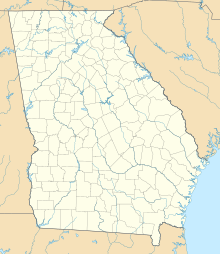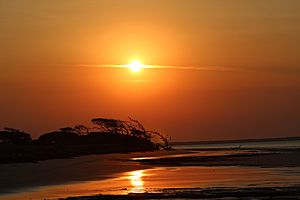Blackbeard Island National Wildlife Refuge facts for kids
Quick facts for kids Blackbeard Island National Wildlife Refuge |
|
|---|---|
|
IUCN Category IV (Habitat/Species Management Area)
|
|
| Location | McIntosh County, Georgia |
| Nearest city | Savannah, Georgia |
| Area | 5,618 acres (118 km²) |
| Established | 1924 |
| Visitors | 130,000 (in 2004) |
| Governing body | U. S. Fish and Wildlife Service |
| Website | Blackbeard Island National Wildlife Refuge |
The Blackbeard Island National Wildlife Refuge is a special place in McIntosh County, Georgia. It covers about 5,618 acres (which is about 118 square kilometers). This refuge was created to protect nature and forests. It helps keep the area beautiful and safe for wildlife.
It is one of seven refuges managed by the Savannah Coastal Refuges Complex in Savannah, Georgia.
Island History
The island gets its name from Edward Teach, a very famous pirate. There's a legend that he buried some of his treasure here! But don't get too excited – no one has ever found a single gold coin. The last big treasure hunt happened in the 1880s. Since then, no one has been allowed to dig for treasure.
The land for Blackbeard Island was first bought by the Navy in 1800. They used it to get strong oak wood for building ships. In 1924, the island became a preserve for native wildlife and birds. A special announcement in 1940 officially made it the Blackbeard Island National Wildlife Refuge.
Exploring the Island
You can only reach Blackbeard Island by boat. The Fish and Wildlife Service does not provide rides to the island. You can launch your own boat from the public ramp at Harris Neck NWR. This is called Barbour River Landing.
The island has many connected sand dunes. These dunes are covered with thick oak trees and palmetto plants. The island has about 1,163 acres (4.7 square kilometers) of open freshwater or freshwater marsh. There are also 2,000 acres (8.1 square kilometers) of salt marsh that floods regularly. You'll find 2,115 acres (8.6 square kilometers) of coastal forest. Plus, there are 340 acres (1.4 square kilometers) of sandy beach.
Amazing Wildlife
The main goal of the refuge is to provide a safe home for birds during winter. It also protects endangered and threatened animals. These include the loggerhead sea turtle, the American bald eagle, the wood stork, and the piping plover.
You can see many different animals here at different times of the year. Look for large groups of waterfowl (like ducks and geese). You might also spot wading birds and shorebirds. Many songbirds and raptors (like hawks and eagles) live here too. You can also see deer and alligators.
Visitor Information
There is no visitor center at the refuge.



